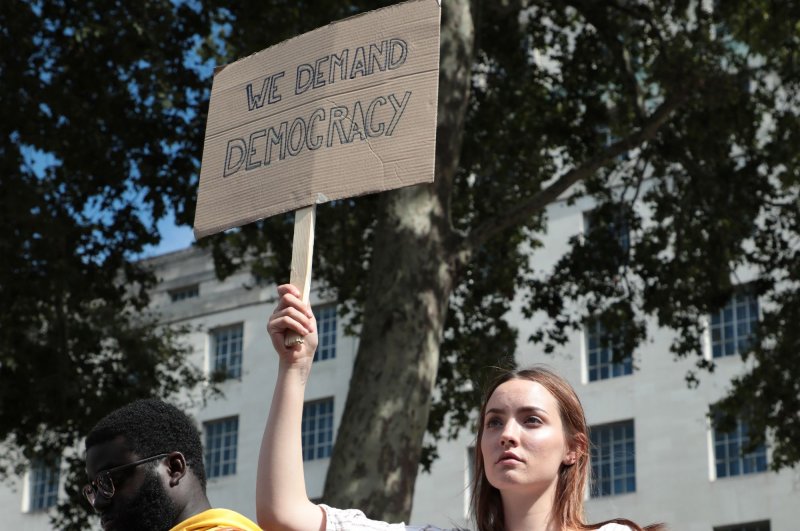Anti-Brexit protesters congregate outside No.10 Downing St. to complain about the British prime minister's decision to shut down Parliament on August 31. Photo by Hugo Philpott/UPI |
License Photo
Eighteen years have elapsed since the attacks of Sept. 11. The impact on America and well beyond the Middle East and Persian Gulf has been profound. Great Britain is experiencing a tectonic unraveling in the form of Brexit that could have equally far-reaching effects for Europe and the Atlantic Alliance as Sept. 11 had for America. At this stage, all likely Brexit outcomes are fraught with danger or disruption.
A glimmer of hope may exist in a simple proposition. People change their minds. On Sept. 1, 1939 and Dec. 7, 1941, the British and American peoples who decidedly opposed war, dramatically and instantly changed their minds. Had that change occurred in 1935, 1936 or 1937, perhaps World War II could have been avoided.
In July 1945, after Winston Churchill magnificently led Britain to victory in that war, he was decisively rejected at the polls. Labor overwhelmed the Conservative Party. Clement Attlee became the new prime minister. Under the socialist agenda, Britain's post-war recovery was retarded. It took years for the economy to approach prosperity. But people had changed their minds, in this case for the worse.
In 1991, after Desert Storm ejected Saddam Hussein from Kuwait, George H.W. Bush's approval ratings reached 90 percent. A year later, and with the help of Ross Perot's 19 percent of the vote, Americans changed their minds. Bill Clinton was elected president.
In a rational world that may only exist in the minds of philosophers and academics, the obvious outcome for Britain is another referendum. The 2016 vote was 52-48 percent to leave the European Union. That was a zero-sum choice in large part distorted by the fabrications and distortions of the Leave Campaign, orchestrated by Dominic Cummings, now senior adviser to Prime Minister Boris Johnson. Knowing then what people know now, the referendum could easily have gone the other way.
The Johnson government, and it may already be a lame duck, promised that Parliament must follow the will of the people as expressed in 2016. Hence, the PM would rather face "hell and high water" or be "dead in a ditch," than delay leaving the EU on Oct. 31. Johnson however has a legal problem. The queen just signed into law an act requiring Parliament either to approve an exit deal or a no deal by Oct. 19 or request an extension from the EU. If Johnson disobeys the law, that is a criminal act.
A new agreement with the EU, however, seems unobtainable. Johnson and his Brexiters have made no progress in changing EU minds. The EU so far sees no reason to readjust the terms agreed to with former Prime Minister Theresa May.
Politically, even if Britons changed their minds, what is the way out of this impasse? Calling an election requires a two-thirds approval by Parliament. That motion was already defeated.
Johnson could resign or find a bypass for holding an election. Presumably, an election will be held. The question is when. If Labor wins and Jeremy Corbyn becomes PM, the economic travails of the Attlee premiership could pale in comparison given the current Socialist Manifesto and its unachievable promises.
More likely, an election could produce a "hung" Parliament in which no party has a majority. How a coalition government could be manufactured and sustained, for the time being strains credulity. Britain could become an Italy or a France from 1918-40 with 33 different governments. And none are likely to resolve BREXIT.
If common sense and the belief that people can change their minds based on new conditions and facts prevail, a referendum is the obvious solution. Yet, what would the public be deciding and how would the propositions be phrased? "Remain" or "leave" are too simplistic and failed before in explaining how.
The best choices are "to leave with an agreement" or "remain if no agreement can be reached" within a certain time frame, say six months. This ballot would follow the new law and give unambiguous guidance to Parliament. Of course, hard-line Brexiters would protest.
Other nasty surprises lurk. Under certain conditions, Scotland and possibly Northern Ireland could choose to remain in the EU and leave the United Kingdom. But withdrawal would raise impossibly difficult challenges such as borders; currencies, tariffs and taxes; and the fate of England's Scottish-based nuclear deterrent.
For Europe and the Atlantic Alliance, Brexit could hardly come at a worse time. To cynics, Johnson may accomplish what Napoleon and Hitler failed to do over years: destroy the British political system. Still the best advice is to let the people decide. After all, people do change their minds.
Perhaps Johnson will too.
Harlan Ullman is UPI's Arnaud de Borchgrave Distinguished Columnist and a senior adviser at the Atlantic Council. His latest book is "Anatomy of Failure: Why America Has Lost Every War It Starts." Follow him @harlankullman.















